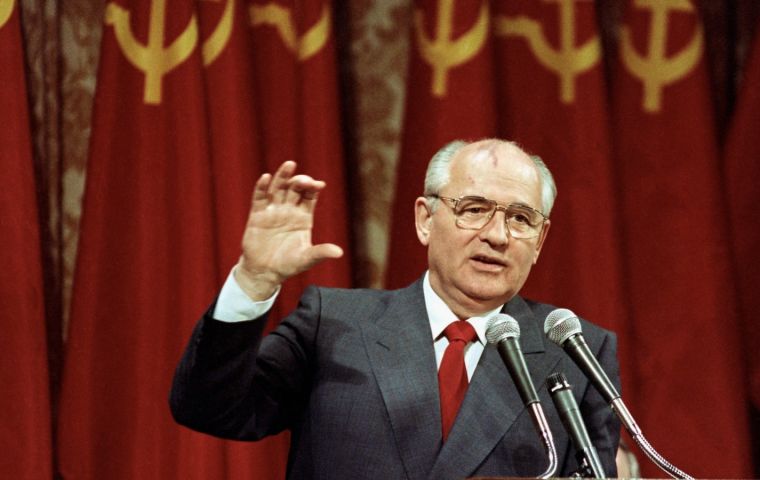MercoPress. South Atlantic News Agency
Mikhail Gorbachev, last Soviet leader and father of Perestroika, has died at 91
 Gorbachev had been living away from the media spotlight for years due to health problems.
Gorbachev had been living away from the media spotlight for years due to health problems. The last president of the Union of Soviet Socialist Republics (USSR) and father of perestroika, Mikhail Gorbachev, died Tuesday in Moscow at the age of 91.
“This afternoon, after a long and serious illness, Mikhail Sergeevich Gorbachev passed away,” sources at the Central Clinical Hospital told RIA Novosti news agency.
Gorbachev had been living away from the media spotlight for years due to health problems. Local media went so far as to claim that he spent months hospitalized for an accumulation of ailments. In 2019 the last Soviet leader was admitted for pneumonia.
Gorbachev was the top Soviet leader when he held the posts of general secretary of the Central Committee of the Communist Party of the Soviet Union (CPSU) between 1985 and 1991 and head of state of the USSR between 1988 -1991. During those years the politician, having to deal with a stagnant economy and seeing the need for a reorganization of the Soviet state, proposed the reforms known as perestroika (reconstruction in Russian) and glásnost (liberalization, openness, transparency), which sought a political, economic and social restructuring of the Soviet bloc.
A supporter of a policy of rapprochement with the West, he won the Nobel Peace Prize in 1990. On December 25, 1991, he was forced to resign from his post as president, which led to the end of the USSR.
His political openness and thaw with the West earned him the Nobel Peace Prize in 1990, but he disappointed his Western supporters by sending troops to Latvia and Lithuania to suppress secessionist movements.
Amidst the unpopularity of the authorities due to commodity shortages, some of the Soviet republics took advantage of the CPSU's loss of monopoly of power to proclaim their independence from Moscow.
The confrontation with their former ally, Boris Yeltsin, the first Russian president elected by universal suffrage, opened an unbridgeable gap that eventually precipitated the demise of the Soviet Union.
The final straw was the coup d'état staged by a group of Soviet leaders, an uprising that was disarmed by an unstoppable Yeltsin, while Gorbachev returned from his imprisonment in the south of the country as a political corpse.
Months later, Gorbachev confirmed the demise of the Union of Soviet Socialist Republics in a historic speech on December 25, 1991.
“Gorbi”, as he was known in the West, was received like a rock star in the West, but his compatriots never forgave him for the demise of the Soviet state and to his dying day many still accused him of treason.




Top Comments
Disclaimer & comment rulesCommenting for this story is now closed.
If you have a Facebook account, become a fan and comment on our Facebook Page!